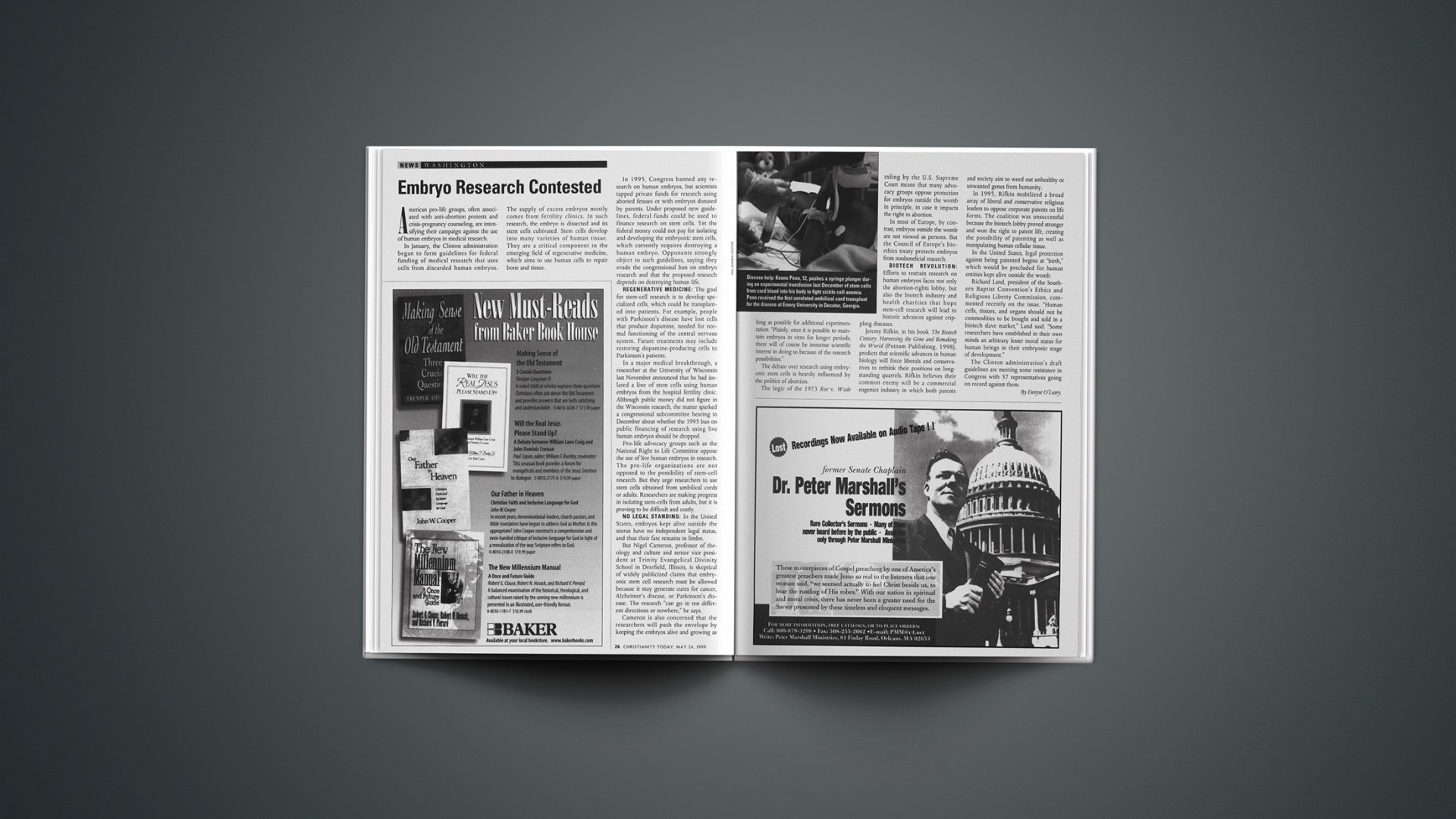American pro-life groups, often associated with anti-abortion protests and crisis-pregnancy counseling, are intensifying their campaign against the use of human embryos in medical research.
In January, the Clinton administration began to form guidelines for federal funding of medical research that uses cells from discarded human embryos. The supply of excess embryos mostly comes from fertility clinics. In such research, the embryo is dissected and its stem cells cultivated. Stem cells develop into many varieties of human tissue. They are a critical component in the emerging field of regenerative medicine, which aims to use human cells to repair bone and tissue.
In 1995, Congress banned any re search on human embryos, but scientists tapped private funds for research using aborted fetuses or with embryos donated by parents. Under proposed new guidelines, federal funds could be used to finance research on stem cells. Yet the federal money could not pay for isolating and developing the embryonic stem cells, which currently requires destroying a human embryo. Opponents strongly object to such guidelines, saying they evade the congressional ban on embryo research and that the proposed research depends on destroying human life.
REGENERATIVE MEDICINE: The goal for stem-cell research is to develop specialized cells, which could be transplanted into patients. For example, people with Parkinson’s disease have lost cells that produce dopamine, needed for normal functioning of the central nervous system. Future treatments may include restoring dopamine-producing cells to Parkinson’s patients.
In a major medical breakthrough, a researcher at the University of Wisconsin last November announced that he had isolated a line of stem cells using human embryos from the hospital fertility clinic. Although public money did not figure in the Wisconsin research, the matter sparked a congressional subcommittee hearing in December about whether the 1995 ban on public financing of research using live human embryos should be dropped.
Pro-life advocacy groups such as the National Right to Life Committee op pose the use of live human embryos in research. The pro-life organizations are not opposed to the possibility of stem-cell research. But they urge re searchers to use stem cells obtained from umbilical cords or adults. Researchers are making progress in isolating stem-cells from adults, but it is proving to be difficult and costly.
NO LEGAL STANDING: In the United States, embryos kept alive outside the uterus have no independent legal status, and thus their fate remains in limbo.
But Nigel Cameron, professor of theology and culture and senior vice president at Trinity Evangelical Divinity School in Deerfield, Illinois, is skeptical of widely publicized claims that embryonic stem cell research must be allowed because it may generate cures for cancer, Alzheimer’s disease, or Parkinson’s disease. The research “can go in ten different directions or nowhere,” he says.
Cameron is also concerned that the researchers will push the envelope by keeping the embryos alive and growing as long as possible for additional experimentation. “Plainly, once it is possible to maintain embryos in vitro for longer periods, there will of course be immense scientific interest in doing so because of the research possibilities.”
The debate over research using embryonic stem cells is heavily influenced by the politics of abortion.
The logic of the 1973 Roe v. Wade ruling by the U.S. Supreme Court means that many advocacy groups oppose protection for embryos outside the womb in principle, in case it impacts the right to abortion.
In most of Europe, by contrast, embryos outside the womb are not viewed as persons. But the Council of Europe’s bio ethics treaty protects embryos from nonbeneficial research.
BIOTECH REVOLUTION: Efforts to restrain research on human embryos faces not only the abortion-rights lobby, but also the biotech industry and health charities that hope stem-cell research will lead to historic advances against crippling diseases.
Jeremy Rifkin, in his book The Biotech Century: Harnessing the Gene and Remaking the World (Putnam Publishing, 1998), predicts that scientific advances in human biology will force liberals and conservatives to rethink their positions on long-standing quarrels. Rifkin believes their common enemy will be a commercial eugenics industry in which both parents and society aim to weed out unhealthy or unwanted genes from humanity.
In 1995, Rifkin mobilized a broad array of liberal and conservative religious leaders to oppose corporate patents on life forms. The coalition was unsuccessful because the biotech lobby proved stronger and won the right to patent life, creating the possibility of patenting as well as manipulating human cellular tissue.
In the United States, legal protection against being patented begins at “birth,” which would be precluded for human entities kept alive outside the womb.
Richard Land, president of the Southern Baptist Convention’s Ethics and Religious Liberty Commission, commented recently on the issue. “Human cells, tissues, and organs should not be commodities to be bought and sold in a biotech slave market,” Land said. “Some researchers have established in their own minds an arbitrary lesser moral status for human beings in their embryonic stage of development.”
The Clinton administration’s draft guidelines are meeting some resistance in Congress with 57 representatives going on record against them.
Copyright © 1999 Christianity Today. Click for reprint information.










